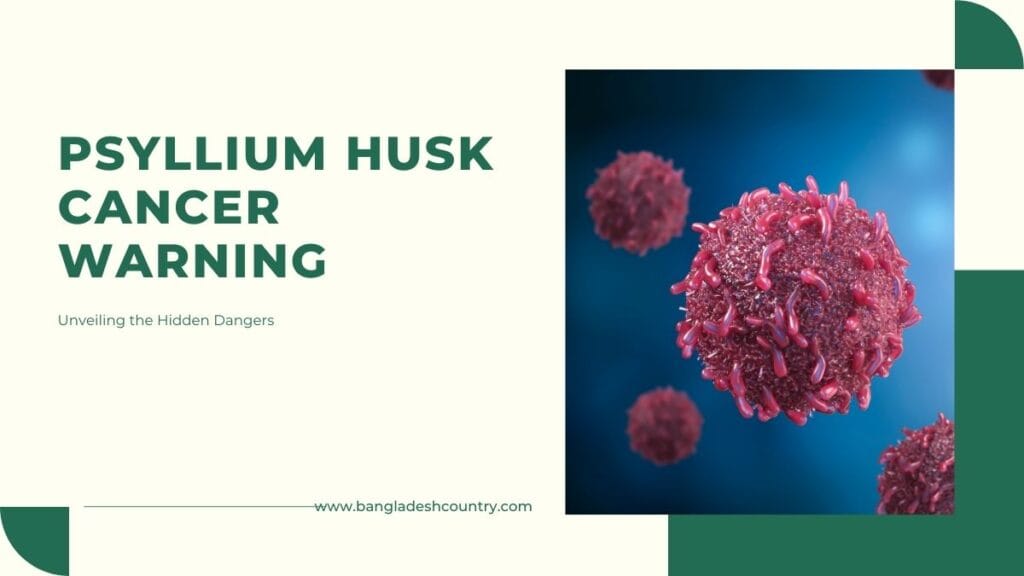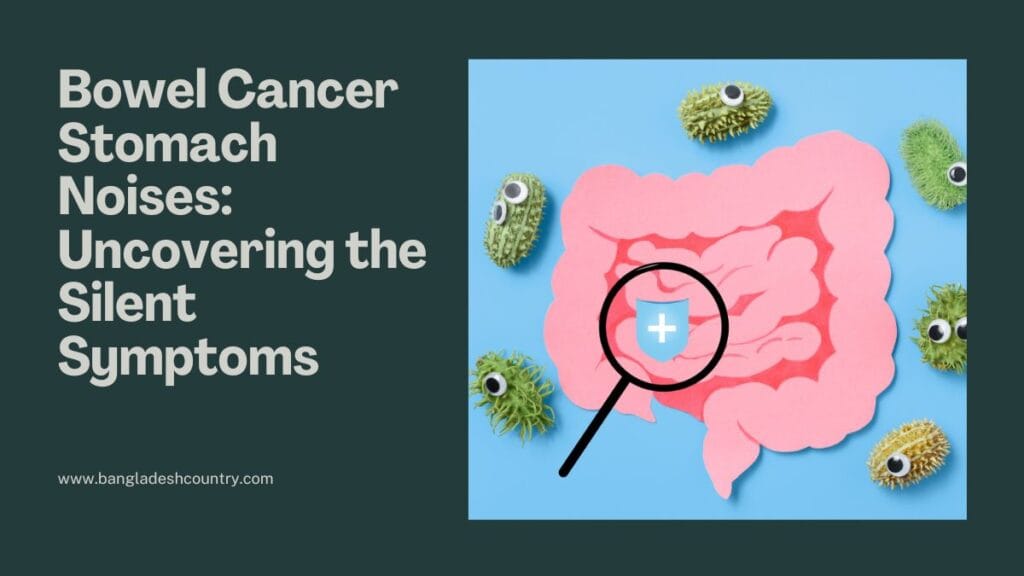Introduction
Understanding the health benefits of psyllium husk has become a priority for many Americans seeking natural digestive solutions. Whether it’s lowering cholesterol, managing blood sugar, or supporting weight loss, psyllium husk supplements are widely praised. But some consumers have been alarmed after noticing a cancer warning label on the packaging of certain products. This warning, often linked to California’s Proposition 65, has led to confusion and concern. Watch this detailed video summary of the key risks and safety guidelines around psyllium husk supplements.
Is psyllium husk truly dangerous? Does the warning indicate a real cancer risk, or is it a regulatory technicality? If you’re using this supplement or thinking about adding it to your routine, it’s essential to understand the facts behind the warning, how psyllium is processed, and what makes some products riskier than others.
This article aims to clarify the reasons behind the psyllium husk cancer warning, identify potential health risks, and provide safer alternatives. With the right information, you can make informed choices without falling for fear or misinformation.
Understanding Psyllium Husk
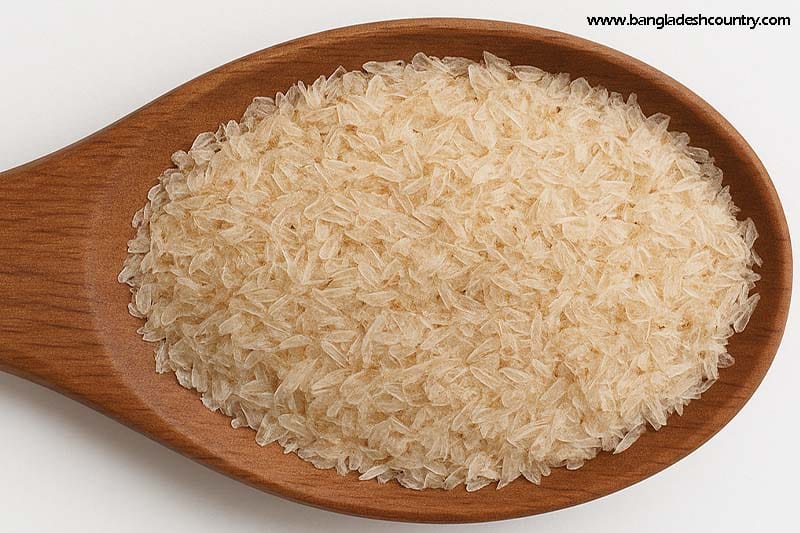
What Is Psyllium Husk?
Psyllium husk is a soluble fiber derived from the seeds of the Plantago ovata plant. It acts as a bulk-forming agent in the digestive tract, meaning it absorbs water and expands, helping to soften stool and promote regular bowel movements. This quality makes it especially useful for people dealing with occasional constipation or irregular digestion.
In the United States, psyllium husk is found in over-the-counter fiber supplements, some breakfast cereals, and popular branded products like Metamucil. It’s often promoted for its ability to lower LDL cholesterol, manage blood sugar levels, and even aid weight loss by increasing satiety.
Despite being plant-based and considered safe, psyllium husk isn’t free from risks. In recent years, concerns have emerged around how this fiber is processed, particularly when high heat is involved. This is where the cancer warning comes into play—not due to psyllium itself, but because of chemical byproducts that can form during manufacturing.
The cancer label found on certain psyllium supplements stems primarily from Proposition 65, a California regulation that requires companies to disclose when products contain even trace amounts of potentially harmful substances. In many cases, the warning is connected to acrylamide, a chemical that can develop when food or fiber is heated during production.
Understanding the origin of this warning can help consumers decide whether psyllium husk is still a safe choice—and which products are worth avoiding.
If you’re navigating postpartum recovery and considering digestive supplements like psyllium husk, understanding how breast pumps are covered under Medicaid can be equally important for new mothers. You can read 7 Powerful Truths About Medicaid Breast Pumps.
Despite its natural roots, certain processed versions of psyllium have come under scrutiny due to contamination risks during manufacturing. This is where the Psyllium Husk Cancer Warning begins to surface—especially under California’s Proposition 65 regulations.
Health Benefits of Psyllium Husk
Psyllium husk is widely recognized for its multiple health benefits, especially when consumed regularly and with sufficient water. As a rich source of soluble fiber, it plays a vital role in digestive wellness and cardiovascular health. Despite its versatility, the popularity of psyllium fiber supplements has raised concerns about how these products are processed, packaged, and regulated. This is where the psyllium husk cancer warning comes into the picture—a label some products must carry under specific state regulations.
Supports Digestive Regularity
One of the most well-known benefits of psyllium husk is its effectiveness in regulating bowel movements. When mixed with water, the fiber expands in the digestive tract and forms a gel-like substance that helps move waste through the intestines. This makes it a reliable solution for individuals suffering from occasional constipation or irregularity.
Lowers LDL Cholesterol
Clinical studies have shown that psyllium husk may contribute to reducing LDL (bad) cholesterol levels. When taken daily, the soluble fiber binds to cholesterol in the gut and helps carry it out of the body before it can be absorbed. The U.S. Food and Drug Administration permits certain health claims on food labels regarding the benefits of soluble fiber from psyllium in lowering the risk of heart disease.
Improves Blood Sugar Management
For individuals with type 2 diabetes or those looking to manage blood sugar spikes, psyllium can offer modest benefits. Its ability to slow digestion also slows the absorption of sugar into the bloodstream. This makes it a helpful dietary addition for people monitoring glucose levels, as long as it’s taken consistently and as directed.
Aids in Weight Control
Many people also use psyllium husk as part of a weight loss plan. Because it expands in the stomach and promotes a sense of fullness, it may help reduce appetite and limit calorie intake. While not a replacement for a balanced diet or exercise, it can serve as a useful addition for those seeking better portion control.
How Psyllium Husk Is Commonly Consumed
Psyllium husk is available in several convenient forms to suit different preferences:
- Whole husks, which can be stirred into water or juice
- Powdered versions, often sold as dietary fiber supplements
- Capsules, preferred by those who want an easy-to-swallow option
- Pre-mixed into cereals, granola bars, or baked goods
- Added to smoothies or soups for extra fiber without changing taste
While psyllium offers flexibility, it’s essential to pay close attention to how these products are made and processed. The risk tied to certain supplements isn’t about psyllium fiber itself—but about what might be added or created during industrial manufacturing.
This brings us to a growing concern among U.S. consumers: the cancer warning printed on some psyllium husk products. Understanding the science and regulations behind this label is key to making confident and informed supplement choices.
Interestingly, safe storage and temperature control are just as essential when it comes to infant health—especially for breast milk. If you’re curious, here are 7 crucial facts about rewarming breast milk that highlight the risks of bacterial contamination when milk is improperly handled.
Why Some Psyllium Products Carry a Cancer Warning
Seeing a cancer warning on a product labeled as natural and beneficial can be confusing. In the case of psyllium husk supplements, this warning is not about the fiber itself but rather about how it is processed. In many instances, the label is required due to a regulation specific to the state of California known as Proposition 65.
Understanding Proposition 65
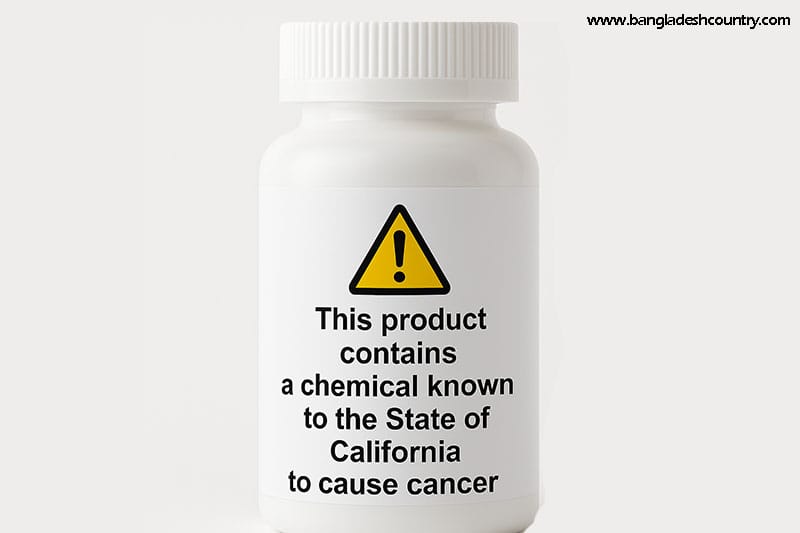
Proposition 65, officially called the Safe Drinking Water and Toxic Enforcement Act of 1986, is a California law that requires businesses to provide warnings when their products contain chemicals known to cause cancer, birth defects, or reproductive harm. The list of these substances is long and includes both synthetic and naturally occurring compounds.
Importantly, the presence of a Proposition 65 warning doesn’t mean that a product is unsafe to use. Instead, it means that the product may contain trace levels of certain chemicals that exceed California’s very strict safety thresholds. Even if these levels are far below those considered hazardous by federal guidelines, companies selling products in California must comply.
Why Psyllium Supplements May Trigger the Warning
The cancer warning on some psyllium husk products is typically due to the presence of acrylamide—a compound that can form when food or plant-based materials are exposed to high heat. Acrylamide is commonly associated with fried or roasted foods but can also appear during the industrial drying process used in some fiber supplements.
When psyllium husk is exposed to elevated temperatures during manufacturing, especially when it’s roasted or dried quickly to reduce moisture, a chemical reaction can occur. This process may lead to small amounts of acrylamide being present in the final product. If the levels exceed the allowable threshold set by California, the warning label becomes mandatory.
What Is Acrylamide and Why Does It Matter?
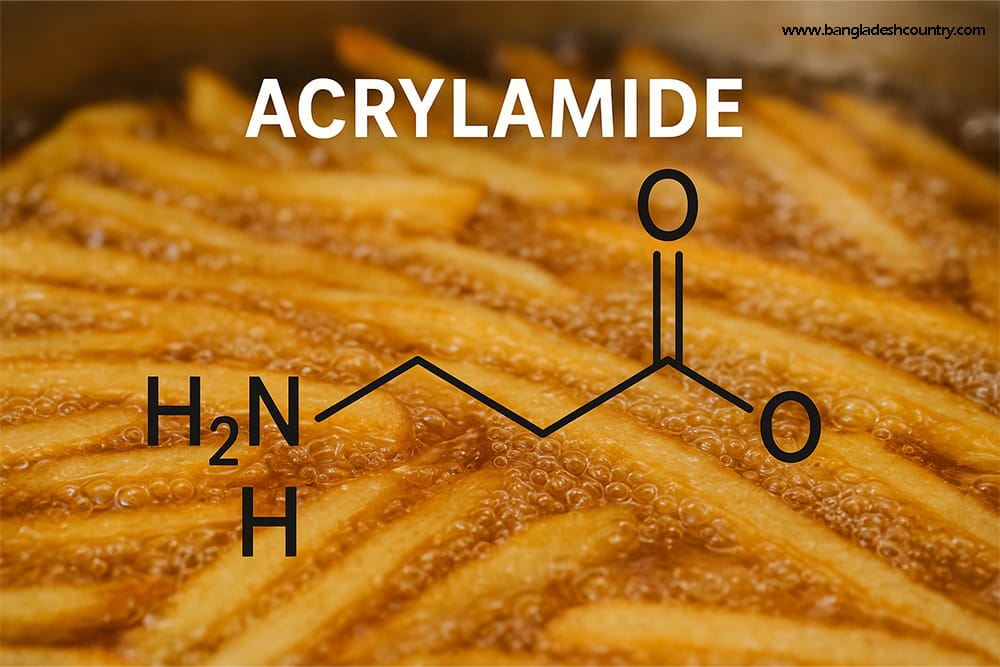
Acrylamide is a compound that has been extensively studied for its potential health effects. Animal studies have shown that long-term exposure to high levels of acrylamide can increase the risk of certain cancers. While the evidence in humans is less clear, regulatory agencies such as the Environmental Protection Agency (EPA) and the National Toxicology Program (NTP) consider it a probable human carcinogen. California’s Proposition 65 requires warnings for products containing chemicals linked to cancer, even at trace levels. See official Proposition 65 chemical list.
For this reason, products that contain detectable levels of acrylamide—even in small amounts—are flagged under Proposition 65. Though federal agencies like the FDA do not require these warnings, manufacturers doing business in California must comply with the state’s more stringent labeling rules. Acrylamide is still being studied for its long-term effects in humans. American Cancer Society’s take on acrylamide.
The Risk Is in the Processing, Not the Fiber
Psyllium husk in its natural, untreated form is not carcinogenic. The concern comes only when it’s exposed to high heat or manufactured using processes that increase the risk of contaminant formation. Most warnings appear on lower-cost or mass-produced fiber supplements that do not use controlled drying methods or third-party testing.
Some products may also carry a Proposition 65 label due to trace contamination with heavy metals such as lead or arsenic—another byproduct of poor manufacturing or improper sourcing. This is especially common in unregulated imports or budget brands that do not follow rigorous quality assurance protocols.
Choosing a high-quality psyllium husk product that avoids high-heat processing and undergoes regular third-party testing can greatly reduce or even eliminate this risk.
Potential Side Effects of Psyllium Husk
Although psyllium husk is plant-based and widely regarded as safe, it’s not without potential drawbacks. Like many dietary supplements, its benefits depend on how it’s consumed and who is using it. When misused, even natural fiber can lead to discomfort or serious complications.
Digestive Discomfort
The most common side effects of psyllium husk are gastrointestinal. These include:
- Bloating
- Gas
- Abdominal cramping
- A sensation of fullness
These symptoms are typically mild and occur most frequently in individuals who are new to fiber supplements. As your body adjusts, the effects usually subside. However, if symptoms persist, it may indicate that the dosage is too high or water intake is insufficient. In fact, those committed to natural wellness often explore how fiber-rich diets and clean nutrition also play a role in overall body tone and aesthetics. Here are 7 shocking truths about getting perky breasts that highlight how lifestyle choices—including dietary fiber—may support natural firmness and confidence.
Choking and Obstruction Risks
One of the more serious, though rare, dangers of psyllium husk comes from how it interacts with liquid. Because it forms a gel when mixed with water, psyllium must always be taken with an adequate amount of fluid. If taken dry or with too little liquid, the husk can swell in the throat or digestive tract.
This may lead to choking, especially in older adults or individuals with swallowing difficulties. In extreme cases, it can cause a blockage in the intestines, which may require medical intervention.
Long-Term Use and Dependency
Regular use of psyllium husk as part of a fiber supplementation routine can support digestion, but over-reliance may lead to problems. Taking psyllium every day for long periods without breaks may reduce your body’s natural ability to maintain regular bowel movements on its own.
Additionally, excessive fiber intake might interfere with the absorption of certain minerals and medications. If you’re taking prescription drugs, it’s best to consult your doctor to ensure no interaction occurs.
Allergic Reactions and Sensitivities
Although rare, allergic reactions to psyllium husk have been reported. These can include:
- Itching or rashes
- Watery eyes
- Breathing difficulties
- Anaphylaxis in extreme cases
People with sensitivities to plant-based materials or seed-derived products are more likely to experience these effects. If you notice any symptoms after taking psyllium, discontinue use immediately and seek medical attention.
Contamination Risks in Low-Quality Products
Not all fiber supplements are created equal. Some low-cost or poorly regulated brands may be contaminated with substances such as mold, pesticides, or heavy metals. This not only increases the risk of side effects but may also contribute to the presence of a cancer warning label.
Imported or bargain fiber supplements, especially those purchased online from unfamiliar sellers, are more likely to bypass quality control and carry hidden health risks.
For best results, always choose psyllium husk products that are certified organic, non-GMO, and tested by an independent lab. This helps ensure you’re getting clean, safe fiber without hidden ingredients or dangerous byproducts.
Seven Critical Risk Factors to Consider Before Using Psyllium Husk
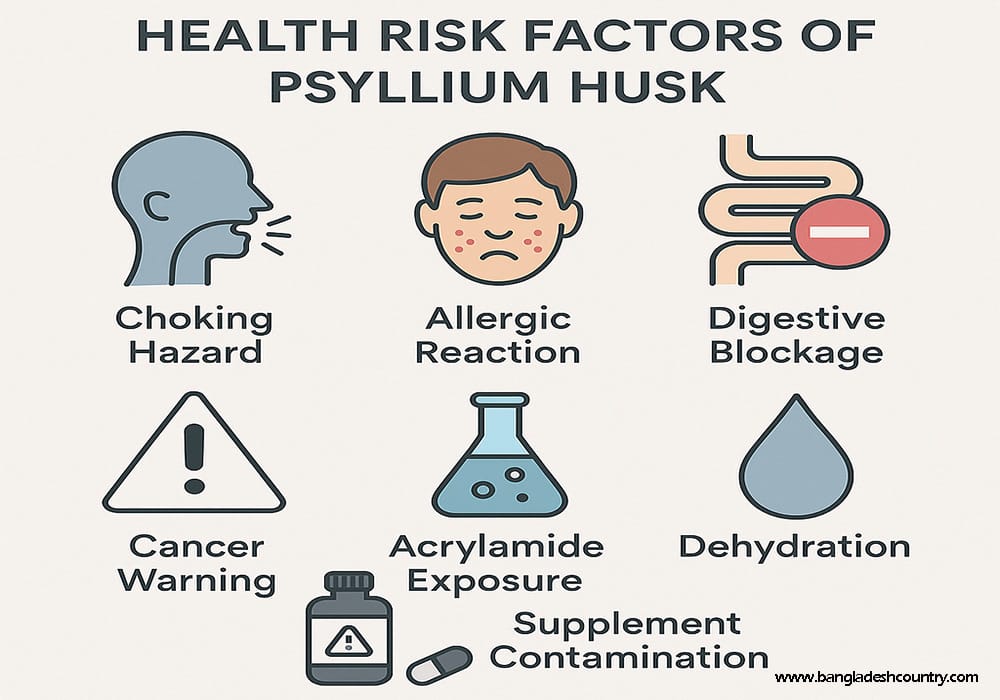
While psyllium husk is widely used for its health benefits, certain risks often go overlooked. These are not directly tied to the fiber itself but rather to how it’s processed, consumed, and stored. Below are seven risk factors that can help explain why some psyllium husk products carry a cancer warning—and why extra caution may be necessary for long-term users.
1. Acrylamide Exposure During Industrial Processing
One of the leading concerns tied to certain psyllium husk supplements is the formation of acrylamide, a potentially harmful compound that develops during high-heat treatment. In manufacturing, psyllium may be roasted or rapidly dried to remove moisture, a process that can trigger chemical reactions resulting in acrylamide byproducts.
Although acrylamide occurs in many common foods, such as toasted bread and fried snacks, fiber supplements that undergo high-temperature processing may contain detectable levels that exceed Proposition 65’s limits. Over time, frequent consumption of products with trace acrylamide may increase one’s overall exposure—especially among sensitive individuals.
2. Overconsumption of Fiber Supplements
There’s a common misconception that more fiber is always better. In reality, consuming excessive amounts of psyllium husk—especially in powder form—can lead to bloating, gas, or more severe gastrointestinal issues. In extreme cases, it may contribute to partial intestinal obstruction.
When overused, fiber supplements may also impair nutrient absorption, especially for minerals like calcium, iron, and magnesium. Individuals taking multiple daily servings, or combining psyllium with other supplements, face a higher risk of these effects.
3. Inadequate Water Intake
Psyllium husk must be taken with a sufficient amount of water. When mixed with fluid, it swells to form a gel-like mass that helps regulate digestion. However, when swallowed dry or with only a small sip of liquid, it can expand in the throat or esophagus and cause choking.
This risk is particularly high in children, older adults, or anyone with a history of swallowing difficulties. Taking psyllium with at least 8 ounces of water—and following with another glass—is strongly recommended to ensure safe passage through the digestive tract.
4. Contamination from Low-Quality Supplements
Supplements sourced from unverified or budget brands may contain impurities that are not listed on the label. These include:
- Residual pesticides
- Heavy metals like lead or mercury
- Industrial byproducts from unclean manufacturing equipment
These contaminants may contribute to cancer warnings or trigger allergic reactions. Without third-party testing or proper regulatory oversight, these products pose a risk to consumers looking for clean-label fiber options.
5. Mislabeling and Lack of Ingredient Transparency
Many fiber supplements sold online—especially through third-party marketplaces—lack proper labeling. Without clear sourcing information, ingredient verification, or batch testing, users may be consuming more than they realize. Some of these products may even include additives or preservatives not disclosed on the packaging.
Inconsistent labeling makes it difficult to track your daily intake or evaluate potential risks. This issue is especially common with imported products or private-label supplements that are repackaged for resale.
6. Mold Growth from Improper Storage
Because psyllium husk is highly absorbent, it must be stored in a cool, dry place. Exposure to moisture can lead to mold or bacterial growth. Products stored in humid environments or poorly sealed containers may develop mycotoxins—substances known to be harmful to human health and possibly carcinogenic.
If your psyllium product has a clumpy texture, unusual smell, or off-color appearance, it may be contaminated. Always check expiration dates and packaging seals before use.
7. Weak International Regulation and Manufacturing Standards
Not all countries enforce the same production standards for dietary supplements. Psyllium husk products manufactured outside the United States may not be held to strict purity or safety guidelines. Without regular audits or lab testing, these supplements are more likely to contain unsafe levels of contaminants like acrylamide or heavy metals.
Consumers buying psyllium in bulk or from international vendors should verify sourcing details. Products lacking certification or country-of-origin labeling may pose higher health risks, particularly for long-term users or individuals with compromised immune systems.
Safer Alternatives to Psyllium Husk: Exploring Natural Fiber Sources
With rising concerns about processed supplements and Proposition 65 warnings, many health-conscious consumers are turning to more natural ways of increasing fiber intake. Fortunately, there are several whole-food sources of dietary fiber that offer the same digestive and heart health benefits—without the risks associated with industrial processing.
Why Consider Natural Alternatives?
The warnings seen on some psyllium husk supplements are not about the fiber itself but about how it’s processed. These concerns, along with the possibility of contamination from heavy metals or acrylamide, have pushed consumers to seek cleaner, simpler options.
Whole foods contain fiber in its most natural state. Unlike powders or capsules, these foods also offer additional nutrients like vitamins, minerals, healthy fats, and antioxidants—components that isolated fiber supplements lack.
Choosing natural sources of fiber doesn’t just help with digestion; it also supports overall well-being, immune function, and long-term colon health.
Top Natural Fiber-Rich Foods to Include in Your Diet
Here are some of the best whole-food alternatives to psyllium husk, all of which are safe, widely available, and easy to integrate into meals.
Chia Seeds
Chia seeds are a versatile, nutrient-dense option. They provide both soluble and insoluble fiber, along with omega-3 fatty acids, protein, and antioxidants. When soaked in liquid, chia forms a gel-like texture similar to psyllium, making it helpful for regulating bowel movements and promoting satiety.
Flaxseed
Flaxseeds are another rich source of both soluble fiber and lignans—plant compounds with antioxidant and anti-inflammatory properties. Ground flaxseed is especially beneficial for heart health and may help improve cholesterol levels. It also supports regular digestion when consumed with plenty of water.
Oats
Oats contain beta-glucan, a form of soluble fiber known for lowering LDL cholesterol and stabilizing blood sugar. They’re also filling and easy to prepare, making them an ideal breakfast choice for those looking to increase fiber intake naturally.
Lentils and Beans
Legumes such as lentils, black beans, chickpeas, and kidney beans are loaded with fiber, protein, and essential nutrients like iron and folate. They offer a balanced combination of soluble and insoluble fiber and support digestive regularity without relying on processed supplements.
Vegetables
Leafy greens, carrots, Brussels sprouts, broccoli, and sweet potatoes are excellent sources of dietary fiber and rich in phytonutrients. These foods also contain water, which helps the fiber function effectively in the gut and reduces the chance of bloating or cramping.
Why Whole-Food Fiber Is Lower Risk
Unlike psyllium-based supplements, these natural fiber sources are unlikely to contain contaminants like acrylamide or heavy metals. They don’t require industrial drying or flavoring, and they tend to be consumed fresh or lightly cooked—further reducing the risk of unwanted byproducts.
Whole foods are also more easily absorbed and digested by the body, supporting a healthier gut microbiome and reducing dependency on external supplements for bowel regulation.
Making the Transition to Whole-Food Fiber
Switching to natural fiber sources doesn’t have to be complicated. You can start by:
- Adding a tablespoon of chia or ground flaxseed to smoothies or oatmeal
- Replacing one meal a day with a lentil-based soup or bean salad
- Choosing vegetables like broccoli or carrots as your primary side dish
- Starting the morning with a bowl of rolled oats or steel-cut oatmeal
These small changes can have a significant impact on your digestive health and reduce your reliance on processed fiber powders or pills.
Comparison Table: Psyllium Husk vs Natural Fiber Sources
| Fiber Source | Type of Fiber | Risk of Cancer Warning | Processing Concerns | Nutritional Benefits |
|---|---|---|---|---|
| Psyllium Husk | Soluble (Isolated) | Possible (Prop 65) | High (industrial drying) | Minimal beyond fiber |
| Chia Seeds | Soluble + Insoluble | No | Low | Omega-3s, antioxidants, protein |
| Flaxseed | Soluble + Lignans | No | Low | Antioxidants, heart-healthy fats |
| Oats | Soluble (Beta-glucan) | No | Moderate | Iron, B vitamins, satiety benefits |
| Lentils & Beans | Soluble + Insoluble | No | Minimal | Protein, folate, gut health support |
This comparison shows that natural fiber sources not only carry fewer safety concerns but also deliver a broader range of nutrients.
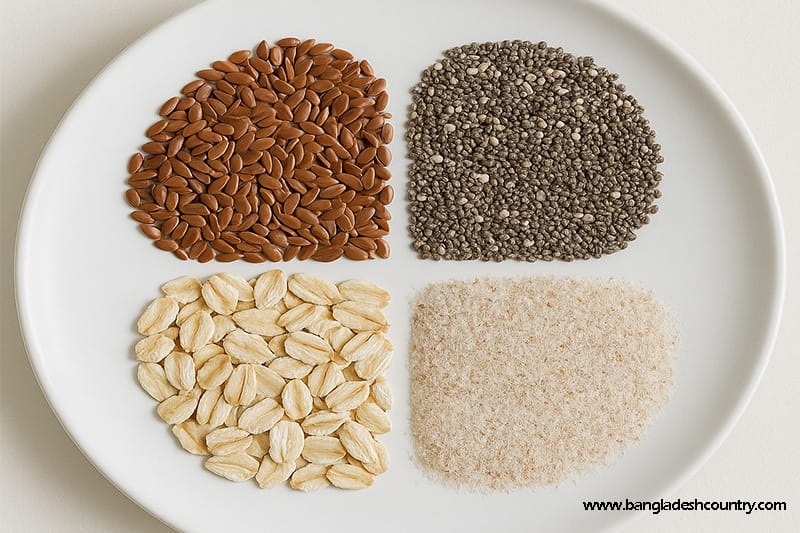
What Experts and Research Say About Psyllium Husk Cancer Warning
Concerns around the psyllium husk cancer warning have grown with increased public interest in supplement safety. But what does the scientific community say? Research studies and statements from leading institutions can provide a clearer, evidence-based perspective.
FDA Stance on Psyllium Husk
The U.S. Food and Drug Administration (FDA) recognizes psyllium husk as a beneficial source of dietary fiber, especially in the context of heart health. In fact, the FDA allows food manufacturers to state that diets low in saturated fat and cholesterol, including those containing soluble fiber from psyllium husk, may reduce the risk of coronary heart disease. You can explore this in the FDA’s Questions and Answers on Dietary Fiber.
However, the FDA does not require a cancer warning on psyllium products unless they violate contamination thresholds or labeling regulations. Warnings such as those seen under California’s Proposition 65 fall under state—not federal—law.
American Cancer Society’s Position on Acrylamide
The American Cancer Society has studied acrylamide for years. According to their official guidance, most acrylamide exposure in the human diet comes from high-heat cooking processes such as frying or roasting carbohydrate-rich foods. While animal studies have shown an increased risk of cancer from acrylamide, evidence in humans remains limited and inconclusive.
Still, the organization advises minimizing exposure when possible—especially from processed or overly heated foods. This includes being mindful of how supplements are manufactured.
Peer-Reviewed Studies and Psyllium Fiber
A widely referenced study published in 2019 and available on PubMed (PMID: 31455673) examined the broader impact of dietary fiber on gut and colon health. The study confirmed the benefits of fiber supplementation in supporting microbiome balance and improving digestive function.
However, it also highlighted the importance of manufacturing standards. The researchers noted that poor processing practices can introduce contaminants like acrylamide and emphasized the value of choosing supplements that undergo purity testing.
While this research does not classify psyllium husk as carcinogenic, it reinforces that the safety of any fiber supplement depends not only on its ingredients but also on how it is prepared and stored.
Expert Consensus: Risk Comes from Processing, Not the Fiber
No credible scientific body has labeled psyllium husk itself as a carcinogen. The main concern lies in contamination—either through heat-induced chemical changes or through exposure to external pollutants like mold or heavy metals.
Experts agree that:
- Psyllium husk is safe when processed under controlled conditions
- Acrylamide formation is preventable with low-heat manufacturing
- Daily use is generally safe if taken with sufficient water
- Users should avoid low-quality or unverified products
By aligning with this consensus, consumers can take advantage of psyllium’s benefits without unnecessary fear.
Safe Usage Guidelines for Psyllium Husk
When used properly, psyllium husk can be a valuable addition to your diet. It supports digestive wellness, heart health, and blood sugar control. However, to minimize the risks tied to side effects and contamination, it’s important to follow some best practices. Whether you’re taking it for regularity, cholesterol, or general fiber support, these tips can help you do so safely.
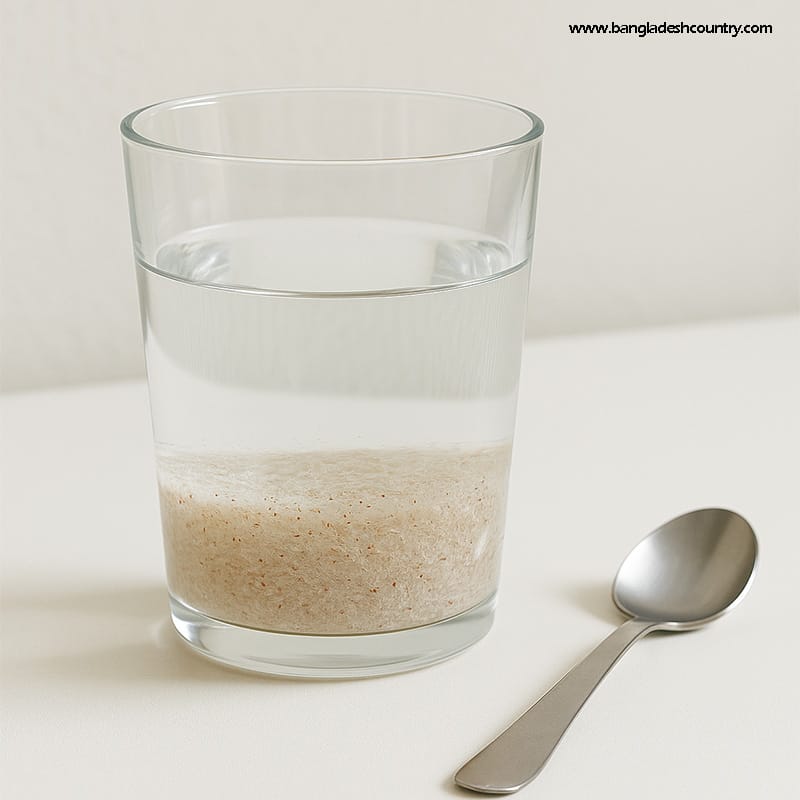
Follow Recommended Dosage
Psyllium supplements typically come with dosing instructions based on the form you’re using. For most adults, a common dose is 5 to 10 grams once or twice daily. Some brands may suggest different amounts based on product concentration or formulation.
Taking more than the recommended amount doesn’t improve effectiveness and may increase the risk of bloating, gas, or intestinal discomfort. Overdosing on fiber can also interfere with your body’s ability to absorb essential nutrients and medications.
If you’re using psyllium for a medical condition, consult your healthcare provider before increasing the dose.
Always Take Psyllium with Water
Hydration is critical when consuming psyllium husk. The fiber swells when it comes into contact with liquid, forming a gel-like consistency. This effect is what helps regulate bowel movements—but it can become dangerous if not enough fluid is present.
For each serving, drink at least 8 ounces (about 240 milliliters) of water. It’s also helpful to follow up with another glass. This helps move the fiber through the digestive tract and reduces the chance of choking or obstruction.
Never take psyllium powder or capsules dry. Doing so may cause it to swell in your throat or esophagus before reaching your stomach.
Choose High-Quality, Third-Party Tested Products
Not all supplements are made with the same level of care. To reduce your exposure to harmful byproducts like acrylamide, it’s best to select products that meet the following criteria:
- USDA Organic
- Non-GMO certified
- Free from artificial preservatives and dyes
- Tested for heavy metals and contaminants by third-party labs
- Labeled with clear sourcing and batch information
Products that are certified by organizations like NSF International or USP are more likely to meet strict purity and safety standards.
Avoid budget brands that lack ingredient transparency or offer bulk deals with no verifiable certification. These are more likely to carry hidden risks, including the need for a cancer warning.
Store Properly to Prevent Mold or Degradation
Psyllium husk is highly absorbent and sensitive to moisture. To keep it fresh and safe for use:
- Store in a cool, dry place
- Use airtight containers
- Avoid storing near heat sources or windows
- Keep the original packaging if it includes a desiccant (moisture absorber)
Improper storage can lead to mold growth, clumping, or a sour smell. These are signs that the product has been compromised and should be discarded.
Listen to Your Body
When you start taking psyllium, you may notice changes in bowel habits or mild digestive reactions. This is often temporary and a sign that your body is adjusting. If symptoms persist or worsen—such as cramping, constipation, or irregular stools—reduce your intake and assess hydration levels.
In rare cases, psyllium may cause allergic reactions. Stop use immediately if you experience itching, swelling, or difficulty breathing.
Read Labels Carefully
If you live in California or are buying from a brand that ships nationwide, some products may carry a Proposition 65 warning. Reading the label helps you understand the reason behind this and lets you choose alternatives if you’re uncomfortable with the risk.
Look for language indicating low-temperature processing or third-party testing for acrylamide levels. Brands that meet these standards often avoid the need for a cancer warning label altogether.
What the Public Is Saying: Addressing Online Confusion and Misinformation about Psyllium Husk Cancer Warning
The presence of a cancer warning on certain psyllium husk products has sparked intense discussions across health forums, Reddit threads, and social media groups. Many users feel uncertain about whether psyllium is safe to take, while others question why a natural fiber supplement would carry such a serious-sounding label.
These reactions are valid, especially when scientific context isn’t readily available. But it’s important to understand that not all warnings signal immediate danger—and not all online advice is trustworthy.
Why Reddit and Forums Amplify Anxiety
Let’s see what is being discussed about the Psyllium Husk Cancer Warning. Platforms like Reddit and health-related discussion boards often reflect real consumer experiences. Users post product photos, share supplement routines, and raise concerns about side effects or unexpected labels. While this can offer useful insight, it can also spread misinformation quickly.
Some commonly asked questions on public forums include:
- “Why does my psyllium husk supplement have a cancer warning?”
- “Is this safe to take daily, or should I switch to something else?”
- “Is Metamucil toxic if used long-term?”
- “Should I avoid anything with a Proposition 65 label?”
The problem is that many answers found online are speculative or based on personal assumptions—not verified health data. These posts often misinterpret state regulations or confuse contamination risks with product ingredients.
What’s Really Behind the Confusion
The main source of uncertainty is Proposition 65. Since it requires labeling for products with even trace amounts of certain chemicals, it tends to create alarm—especially when applied to health-focused items like fiber supplements.
Most users are unaware that this law is specific to California and that many companies issue the label out of legal caution, not because their product poses a proven health risk. Products sold in other states without that label may still contain similar ingredients or processing methods—they’re just not legally obligated to disclose it in the same way.
In other words, the label doesn’t always mean the product is different or more dangerous. It often just means the manufacturer is being transparent under strict guidelines.
How to Filter Fact from Fear
When evaluating information about psyllium husk or any supplement, consider the following steps:
- Check verified sources: Reliable guidance comes from institutions like the FDA, American Cancer Society, or peer-reviewed research databases like PubMed.
- Look for third-party input: Brands that post lab testing results or independent certifications are typically more trustworthy.
- Be skeptical of extremes: Claims that psyllium is “toxic” or “completely harmless” oversimplify a more nuanced situation.
- Read beyond the warning: If a product carries a Proposition 65 label, research the company’s explanation. Many include statements on their websites about what triggered the warning and what steps were taken to minimize risk.
Public Sentiment by Brand and Product Type
Discussions often vary depending on the brand of psyllium supplement. For instance:
- Well-known brands: Products like Metamucil that are made in the U.S. and widely sold in retail stores usually generate fewer concerns. These companies tend to follow stricter manufacturing protocols and conduct quality testing.
- Budget or imported brands: These receive more negative feedback and are more likely to be associated with warning labels, inconsistent quality, or questionable sourcing practices.
Users who’ve had negative experiences with lower-cost brands frequently report symptoms like bloating, poor mixability, or product discoloration. These are signs that the supplement may not meet higher manufacturing standards.
The Role of Clear Communication
Ultimately, a large part of the confusion comes from unclear labeling and lack of consumer education. If companies took more steps to explain why a warning is present—or what their safety standards are—users would feel more empowered to make informed decisions.
Should You Keep Using Psyllium Husk or Switch to Natural Alternatives?
If you’ve reached this point, you’re probably wondering whether it’s still safe—or even wise—to keep using psyllium husk. The short answer is: it depends on how it’s processed, how your body reacts to it, and how comfortable you are with potential risks like acrylamide exposure or regulatory warnings.
Here’s a breakdown to help you assess your situation and make an informed choice.
Don’t Make a Decision Based on Fear
Seeing a cancer warning label on a supplement can be unsettling. But remember, this doesn’t automatically mean the product is dangerous. In many cases, it simply reflects California’s legal requirement to disclose trace chemical presence, such as acrylamide.
If you’re using a reputable, third-party-tested product, drinking enough water, and staying within the recommended dosage, the health risks are minimal for most people.
Who Should Be Cautious About Psyllium Husk Cancer Warning
Certain individuals may want to reconsider using psyllium husk regularly or without medical guidance. These include:
- Pregnant or breastfeeding individuals, unless cleared by a healthcare provider
- Children, especially under 12, unless advised by a pediatrician
- People with swallowing disorders or history of choking
- Anyone who has experienced allergic reactions to plant-based supplements
- Individuals who regularly use low-cost or poorly regulated fiber products
If you fall into one of these categories, talk to a doctor before continuing daily use.
When to Consider Switching to Natural Fiber Alternatives
You may benefit from switching to whole-food fiber sources if:
- You’re uncomfortable with the cancer warning, regardless of risk level
- You experience ongoing digestive discomfort when using psyllium
- You prefer to consume fiber as part of a complete, unprocessed food
- You’re seeking fiber with additional health benefits, such as antioxidants or plant-based protein
- You’re looking for options that don’t require manufacturing or labeling transparency to feel safe using
Chia seeds, oats, flaxseed, lentils, and vegetables can provide equal or better support for your digestive health without the complications tied to processed supplements.
How to Transition Smoothly
If you’re ready to replace psyllium husk with whole-food alternatives, here are a few practical steps:
- Start small: Add one or two new fiber-rich foods to your meals per day
- Keep hydrated: Just like with psyllium, fiber from natural sources requires water to work effectively
- Monitor digestion: Pay attention to how your body responds. You may find that whole-food fiber is easier to tolerate and more satisfying
- Avoid layering: Don’t take psyllium and eat large amounts of beans or flaxseed in the same meal. This can overwhelm the digestive system
Balance Is Key
There is no one-size-fits-all answer when it comes to fiber supplementation. Some people respond well to psyllium and have no issues using it long-term. Others may experience discomfort, or simply prefer getting fiber from natural food sources. The most important thing is to make a decision that fits your body, your comfort level, and your long-term health goals.
Whether you continue using psyllium husk or choose a more natural alternative, being informed is the best way to stay healthy and safe.
Conclusion
The cancer warning found on some psyllium husk supplements has understandably caused concern, especially among health-conscious individuals who rely on natural products for digestive and heart health. But the reality is more nuanced than a simple label suggests.
Psyllium husk itself is not a carcinogen. The risk stems from how it’s processed—especially under high heat—and whether contaminants like acrylamide or heavy metals are introduced. These concerns, while valid, are primarily linked to specific manufacturing practices and not the fiber in its natural form. We have our own deep research file. You can look at it if necessary. Personal Topic Research File – Google Drive: Psyllium Husk Cancer Risk.
For most healthy adults, psyllium remains a safe and effective source of dietary fiber—especially when consumed with sufficient water and selected from reputable, third-party-tested brands. However, if you’re uncomfortable with Proposition 65 warnings, prefer whole-food nutrition, or want to minimize exposure to any industrial byproducts, alternatives like chia seeds, flaxseed, and oats offer excellent options.
The key takeaway is not to fear fiber—but to choose wisely, read labels carefully, and focus on products and practices that align with your personal health goals.
Frequently Asked Questions about Psyllium Husk Cancer Warning
Does psyllium husk cause cancer?
No, psyllium husk itself does not cause cancer. The warning on some products is due to trace acrylamide formed during high-heat processing—not the fiber itself.
Why does psyllium have a Proposition 65 warning?
The warning is required under California law if the product contains even small amounts of chemicals like acrylamide, which can form during industrial drying.
Is psyllium husk safe to take every day?
Yes, for most healthy adults. Just ensure you follow dosage instructions, drink enough water, and use high-quality, certified supplements.
What are some good alternatives to psyllium husk?
Chia seeds, flaxseed, oats, lentils, and beans are fiber-rich whole foods that support digestion and colon health—without the need for supplement labels.
How can I choose a safe psyllium product?
Look for USDA Organic or non-GMO certification, third-party lab testing, and labels that explain their processing methods or contamination controls.
About the Author
Jane Doe, Certified Nutritionist
Written by: Jane Doe, Certified Nutritionist. Jane is a U.S.-based certified nutritionist with 12+ years of experience in gastrointestinal wellness and dietary fibers. She regularly contributes to health publications and focuses on debunking nutrition myths with research-backed clarity.
Medically Reviewed by a U.S. Specialist
Medically Reviewed by: Dr. Jonathan Myers, MD – Board-Certified Gastroenterologist
Review Date: July 11, 2025
Information About Dr. Myers: He is a board-certified gastroenterologist based in New York, USA. With over 18 years of experience in digestive health and dietary fiber research, he specializes in colon health, IBS management, and supplement safety. He has contributed to peer-reviewed journals including The American Journal of Gastroenterology and regularly consults on gut-related dietary protocols.

